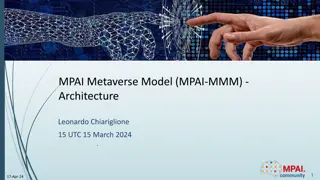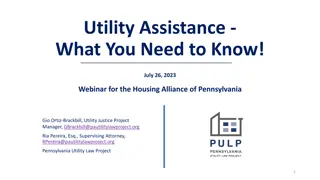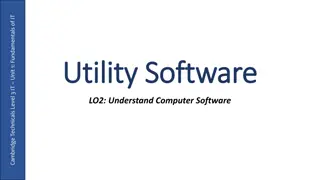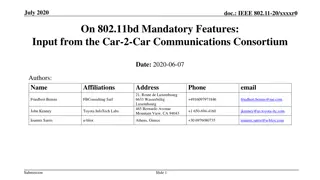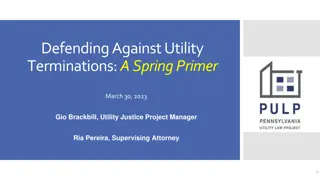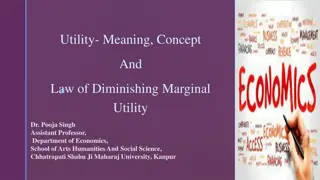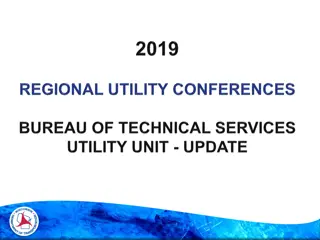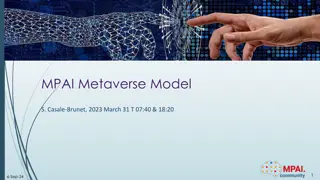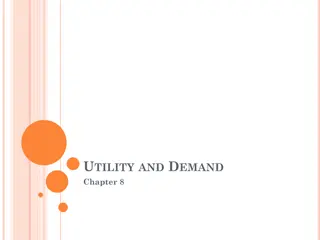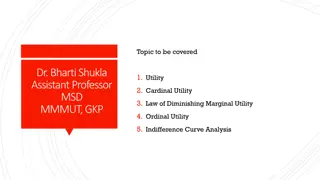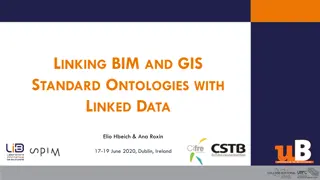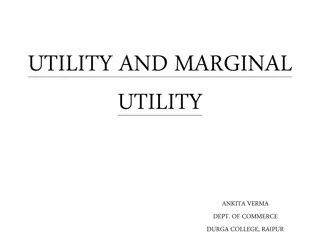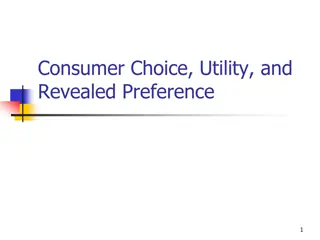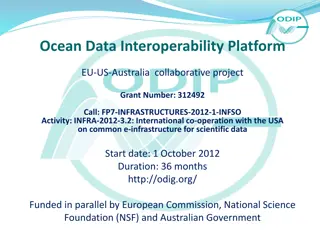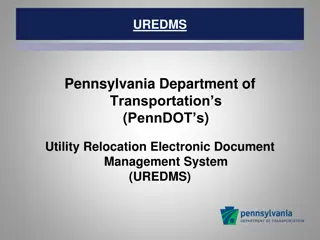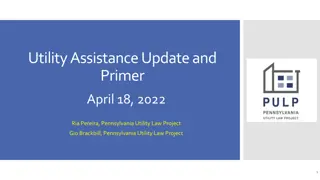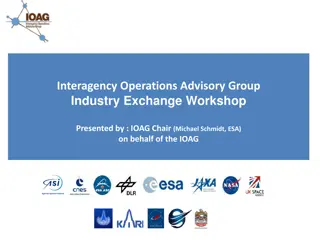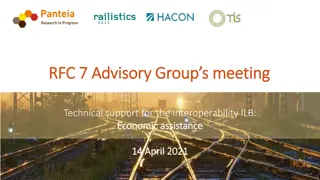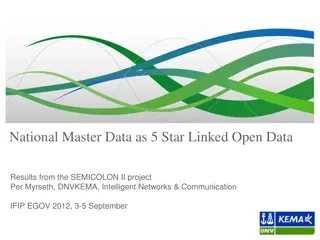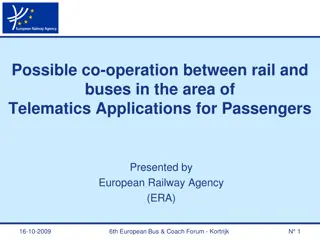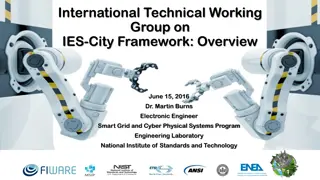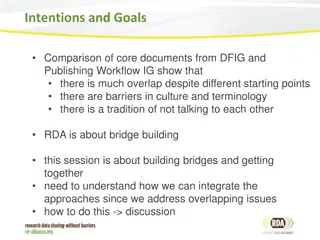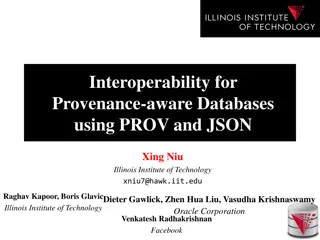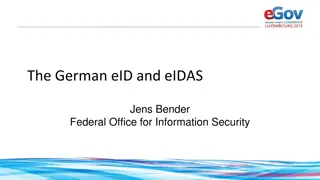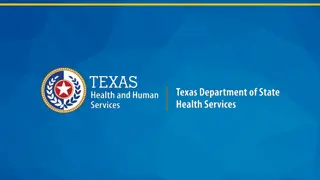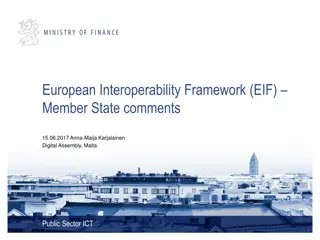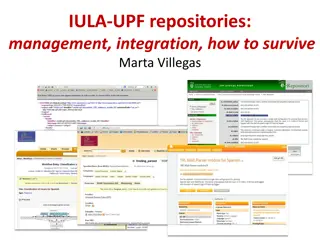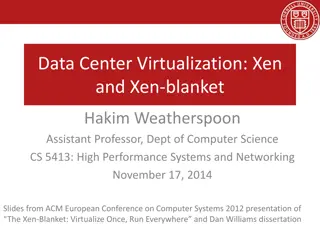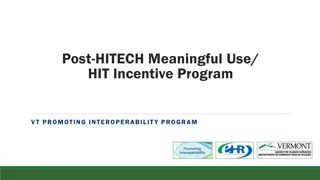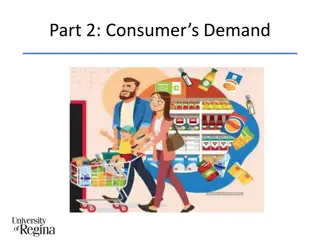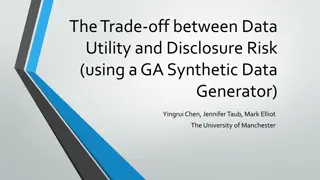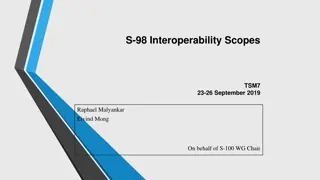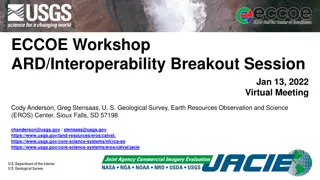Understanding MPAI's Role in Metaverse Interoperability
MPAI, spearheaded by Leonardo Chiariglione, plays a crucial role in defining standards and technologies for the metaverse, ensuring interoperability between different metaverse instances. This involves functional and prescriptive interoperability, enabling seamless data exchange and operation models
3 views • 38 slides
Enhancing Wheat Data Interoperability for Sustainable Production
The wheat research community faces challenges in meeting the increasing demand for wheat production due to a lack of data harmonization and standards. The Wheat Data Interoperability Working Group aims to improve the interoperability of wheat-related data through shared guidelines, tools, and recomm
4 views • 10 slides
Understanding Utility Assistance and Support in Pennsylvania
Gain insights into utility assistance initiatives in Pennsylvania through the perspective of the Pennsylvania Utility Law Project. Topics covered include regulated vs. unregulated utilities, affordability issues, tenant protections, and the impact of utility insecurity on various aspects of life. Di
1 views • 32 slides
Understanding Utility Software in IT Systems
Utility software plays a crucial role in maintaining and configuring computer systems. This unit focuses on key utility software types like defragmentation, backups, compression, anti-virus, and encryption. Understanding the purpose, features, advantages, and disadvantages of utility software is ess
0 views • 9 slides
Proposal for New 802.11bd 20MHz Mode for Enhanced ITS Interoperability
The document discusses the necessity of a new 802.11bd 20MHz mode for improved interoperability within Intelligent Transportation Systems (ITS) due to limitations with current Wi-Fi channels and the scope of 256-QAM modulation. It presents proposals approved by the Car-2-Car Communications Consortiu
0 views • 8 slides
The Impact of Interoperability in Education
Explore the significance of interoperability in education through insightful statistics and data. Learn how improved interoperability can benefit CTOs, teachers, and schools. Discover the challenges and potential solutions related to the seamless sharing of data and digital tools in educational sett
0 views • 30 slides
Defending Against Utility Terminations: A Spring Primer
The Pennsylvania Utility Law Project (PULP) provides assistance and advice on residential utility and energy matters for low-income consumers, aiming to ensure equitable access to affordable utility services. PULP offers direct representation, utility assistance program design, and technical assista
0 views • 47 slides
Understanding Utility: Marginal vs. Total Utility
Utility in economics is the satisfaction derived from consuming goods or services. Marginal utility measures the change in total utility as consumption increases, whereas total utility is the sum of satisfaction obtained from consuming different units of a commodity. Consumers aim to maximize total
2 views • 11 slides
Understanding Utility: Meaning, Concept, and Law of Diminishing Marginal Utility
Utility is the satisfaction or well-being a consumer derives from consuming goods or services. Total utility is the sum of satisfactions, while marginal utility is the additional satisfaction from one more unit consumed. Utility can be measured and ranked but not numerically. The Law of Diminishing
3 views • 9 slides
WisDOT Utility Coordination Efforts for Statewide Projects
WisDOT is testing new processes using DocuSign for utility coordination in statewide projects, aiming to streamline procedures and reduce over-processing. Shane Smith and Dylan Gates are leading the testing phase with utility companies to gather feedback and improve the system. The team's goal is to
5 views • 20 slides
The Road to Metaverse Interoperability: Challenges and Solutions
Metaverse standards and interoperability are crucial for unleashing the full potential of this transformative technology. However, the lack of common agreement on what a metaverse entails poses challenges. The MPAI roadmap addresses key steps towards achieving interoperability, including developing
0 views • 17 slides
Understanding Consumer Choices and Utility Maximization
Exploring how consumers make consumption decisions based on utility theory, marginal utility, and preferences. Analyzing Lisa's consumption possibilities, total utility, and marginal utility to illustrate economic concepts. Discussing the utility-maximizing rule for optimal decision-making in spendi
0 views • 22 slides
Understanding Utility Theory in Economics
Utility theory in economics explores the concept of utility, which refers to the satisfaction or want-satisfying capacity a commodity provides to consumers. It is subjective, relative, and can vary among individuals. Cardinal utility analysis quantifies utility in numbers, while total utility and ma
3 views • 13 slides
OpenFMB Framework: Empowering Utility Interoperability
Open Field Message Bus (OpenFMB) is a framework and reference architecture designed to enable interoperability for Distributed Intelligence Applications, focusing on cybersecurity, microgrids, Distributed Energy Resources (DER), and more. It provides a standard API for Electric Grid interoperability
0 views • 16 slides
Understanding XTCE and SEDS in Mission Operations
XTCE (XML Telemetric and Command Exchange) and SEDS (Space Experiments Data System) are essential tools in mission operations. XTCE serves as a standard database language for telemetry and commanding, while SEDS provides a platform for managing space experiment data. These tools are related through
1 views • 13 slides
Term Overlap Among Matportal Ontologies
The study focuses on term overlap among 5 Matportal ontologies, assessing interoperability and semantic ambiguity. Results show high rates of URI matches between specific ontologies, with discussions on the implications and potential solutions for enhancing interoperability.
0 views • 7 slides
Linking BIM and GIS Standard Ontologies with Linked Data
Introduction to the need for seamless data interpretation between Building Information Model (BIM) and Geographic Information System (GIS), focusing on aligning BIM and GIS standard ontologies for semantic interoperability. Addressing the challenges of data interoperability layers and the characteri
0 views • 15 slides
Understanding Utility and Marginal Utility in Economics
Utility refers to the satisfaction a consumer receives from consuming commodities. It is a subjective concept that can be measured through cardinal or ordinal approaches. Cardinal approach involves measuring utility numerically, while ordinal approach orders levels of satisfaction based on utility.
0 views • 16 slides
Understanding Consumer Choice and Utility Theory
Explore the concepts of consumer choice, utility, and revealed preference in economics. Learn how utility functions help us rank the desirability of consuming different bundles of goods. Discover the mathematical representation of utility and see examples of representing utility in terms of goods co
0 views • 69 slides
Ocean Data Interoperability Platform: EU-US-Australia Collaborative Project
This collaborative project, funded by the European Commission, National Science Foundation (NSF), and Australian Government, aims to develop a collaboration platform for organized dialogue between partners from Europe, the USA, and Australia. The project focuses on establishing a coordination platfo
0 views • 9 slides
PennDOT UREDMS - Utility Relocation Electronic Document Management System
PennDOT's UREDMS (Utility Relocation Electronic Document Management System) is an electronic document management system used for utility relocations. It functions as a virtual filing cabinet, allowing for easier search, faster retrieval, and better revision control of important documents. The system
1 views • 15 slides
Utility Assistance Update and Primer - PULP Focus on Low-Income Residential Utility in Pennsylvania
Today's webinar presented by Pennsylvania Utility Law Project (PULP) focused on LIHEAP programs, tools for preventing termination, and special protections for utility customers. It covered the Winter Moratorium ending, LIHEAP basics, eligibility criteria for cash grants, and more to assist low-incom
0 views • 50 slides
Interagency Operations Advisory Group Industry Exchange Workshop Summary
The Interagency Operations Advisory Group (IOAG) facilitates collaboration among international agencies for space communications policy, procedures, and technical interfaces to ensure safe, secure, and efficient mission operations. It aims to enhance interoperability, network responsiveness, and thr
0 views • 30 slides
Analysis of Economic Assistance and Impacts on Interoperability at RFC-7 Advisory Group's Meeting
Overview of the RFC-7 Advisory Group's meeting discussing technical support for interoperability and economic assistance through the CBA methodology. The results from three case studies and the identification of remaining issues are presented, highlighting the direct and indirect impacts of solving
0 views • 6 slides
Improving Interoperability with Linked Open Data in the SEMICOLON II Project
The SEMICOLON II project aimed to enhance eGov solutions by utilizing Linked Open Data principles to open up public registers and create semantic technologies. The project spanned from 2007 to 2013 with a budget of approximately $15 million, focusing on core national master data maintenance and moti
0 views • 25 slides
European Railway Agency's Role in Promoting Cooperation between Rail and Buses in Telematics Applications
The European Railway Agency (ERA) plays a crucial role in enhancing cooperation between rail and buses through Telematics Applications. Established in 2004, ERA focuses on recommending legislation, ensuring interoperability, and enhancing safety in the European rail network. Recommendations made by
0 views • 17 slides
Advancing Smart Cities: IES-City Framework Overview
The International Technical Working Group on IES-City Framework, led by Dr. Martin Burns, is developing a reference framework for IoT-enabled Smart City technologies to streamline architectural designs and enhance interoperability. The group aims to create a common set of features for Smart Cities,
0 views • 74 slides
Building Bridges and Integrating Approaches in Research for Efficiency and Interoperability
Despite different starting points, there is significant overlap in the core documents of DFIG and Publishing Workflow IG. The session focuses on integrating approaches to address overlapping issues, with an emphasis on building bridges between diverse research cultures and terminology barriers. Key
0 views • 16 slides
Interoperability for Provenance-aware Databases Using PROV and JSON
This research paper discusses the challenges in tracking database provenance and proposes a system, GProM, that computes provenance for database operations. It highlights the importance of exchanging provenance information between systems and the limitations of current relational database systems in
0 views • 28 slides
German eID and eIDAS: Secure Digital Identification Overview
The German eID system, including eIDAS integration, offers secure digital identification services through government-issued ID cards with embedded chips. It allows citizens and service providers to authenticate each other securely online. The system emphasizes interoperability and privacy protection
0 views • 16 slides
Update on Health Information Technology & Policy Committee Insights
The update on health information technology covers recent developments in federal actions related to healthcare reimbursement rates and interoperability rules. Changes in the Medicare Inpatient Prospective Payment System and Hospital Promoting Interoperability Rule impact hospitals, requiring partic
0 views • 12 slides
European Interoperability Framework (EIF) Member State Comments by Anna-Maija Karjalainen
Anna-Maija Karjalainen, Director General of Public Sector ICT in Finland, shares insights on the European Interoperability Framework (EIF) and Finland's progress towards interoperable digital services. The EIF aims to enhance the delivery of public services across Europe, promoting open data, semant
0 views • 5 slides
Challenges in Integrating Different Repositories for Metadata Interoperability
Addressing the integration of repositories with varying schemas and protocols such as OAI-PMH and APIs is crucial for ensuring metadata interoperability. The key requirements include maintaining data integrity through a centralized editing point, leveraging automatic import/export mechanisms, and ad
0 views • 8 slides
Xen-Blanket: Virtualize Once, Run Everywhere
The Xen-Blanket, introduced by Hakim Weatherspoon, aims to address challenges in cloud computing such as lack of interoperability and efficient resource utilization. It enables uniform VM images, advanced hypervisor management, and seamless migration between clouds. The second-layer hypervisor enhan
0 views • 28 slides
Vermont Promoting Interoperability Program Overview
The Vermont Promoting Interoperability Program, formerly known as the Electronic Health Record Incentive Payment program, incentivizes Medicaid providers to adopt, implement, and meaningfully use electronic health records. This program, funded mostly by federal dollars, aims to improve interoperabil
0 views • 16 slides
Understanding Consumer Demand: From Utility Theory to Behavior in the Marketplace
We delve into the relationship between utility theory and consumer demand, exploring how individuals' tastes, preferences, and budget constraints influence their choices. Through examples like Neal's decision between snowboarding and jazz, we see how utility translates into demand curves, guiding co
0 views • 17 slides
Meeting Summary: Interoperability and Gas Quality in Gas Regional Initiative
Discussion highlights from the 38th IG Meeting of the South Gas Regional Initiative teleconference held on July 18, 2016. Focus on interoperability, latest developments, and next steps in the region. Key topics include Interconnection Agreement requirements, gas flow control, gas quantity allocation
0 views • 24 slides
Understanding the Trade-off between Data Utility and Disclosure Risk
This study explores the balance between data utility and disclosure risk using a GA synthetic data generator. The authors delve into measuring utility and risk, emphasizing structured categorical data. They define synthetic data, discuss utility assessment methods, and outline how to measure data ut
0 views • 30 slides
S-98 Interoperability Scopes Overview
This paper discusses options for defining interoperability scopes, restructuring the draft S-98 interoperability specification, and assessing the implications of implementing different levels of interoperability. It suggests a phased introduction with pauses for evaluation, focusing on lower complex
0 views • 8 slides
JACIE ECCOE Workshop on ARD Interoperability Breakout Session Summary
JACIE ECCOE workshop held a breakout session on ARD interoperability covering topics such as calibration, data quality, accuracy, traceable uncertainty, geospatial workflows, governance, and leadership. Various experts led the breakout groups to discuss key questions and actions for improving data q
0 views • 7 slides
